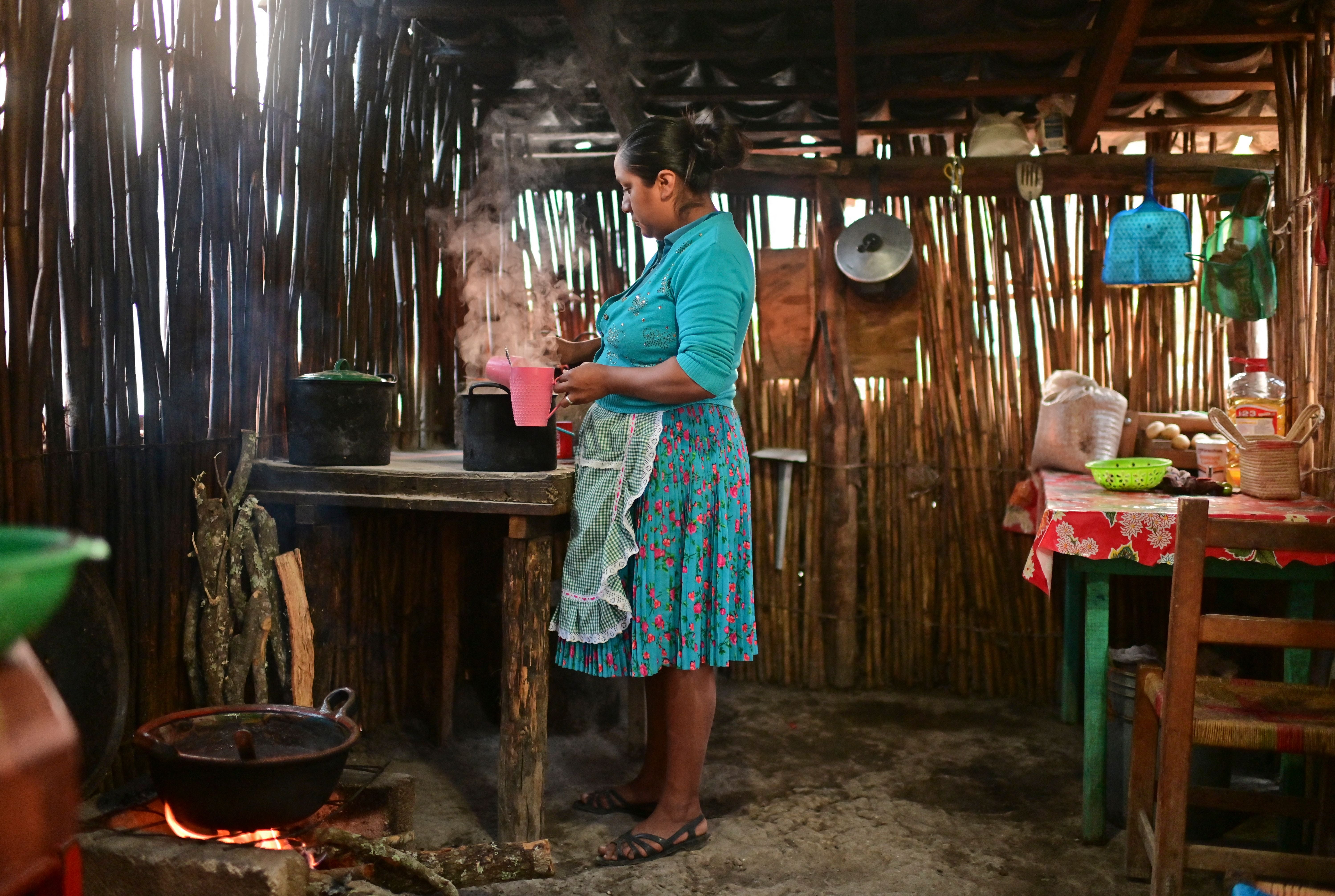‘The husband could kill you at any moment’: The women facing brutal violence in Mexico’s epicentre of crime
‘Heavily armed, fairly young men who are often drunk or high on other substances are roaming around in pick-up trucks,’ one expert tells Maya Oppenheim


“I have never talked about this before,” Juana, who lives in the epicentre of organised crime in Mexico, says. “I feel lighter”.
Juana, who got married at the age of 13, passes her days in the mountains of Guerrero, where she is subjected to unthinkable violence and abuse from her husband of 30 years. She longs to divorce him, but her two sons – who control all of her telephone usage – have forbidden her from leaving him.
Juana’s experience is by no means unique. Violence, fear and subjugation plague the lives of many women in Guerrero. Lying between Mexico City and the Pacific coast, the state of Guerrero is home to more bloody violence between rival cartels than any other part of Mexico.
The boom of detonating weapons is a daily presence for many. At the same time, the production and the trafficking of drugs, kidnappings, extortion, and murder are all rife, as is domestic abuse, rape, and other forms of gender-based violence.
All of these issues have been compounded by the Covid-19 crisis. Aid agency Médecins Sans Frontières tells The Independent that Guerrero state has seen a rise in violence during the pandemic, which is having troubling repercussions on the physical and mental health of thousands.
The mountainous topography of Guerrero – where more than 40 armed groups are wrestling to control the region – means violence often goes unchecked. At the same time, it can be tricky for people living in the mountains to seek help from charities or healthcare services due to being cut off from the wider world. Perpetrators of grave crimes often operate with impunity in Guerrero, with a slew of judges and senior police accused of being in cahoots with criminal exploits.
Dr Nathaniel Morris, a historian who specialises in Mexico’s “drug war”, tells The Independent brutal violence permeates the state and women are key casualties.
“People in Guerrero are isolated from real state aid,” Dr Morris, who is based at University College London, adds. “For many, their only real relationship with the state is being beaten up by soldiers. Men get caught up in all sorts of different violence. Whether that is a local conflict between families or clans, or whether that is a blood feud, where families are locked into a conflict which goes back decades or generations.”
The academic notes that conflict is also fuelled by disputes between communities over land as well as political altercations between communal police forces linked to drug trafficking.
“Then there is straight-up drug-related violence between peasants being attacked by drug cartel types who want to impose control over them and their land and over trade routes for illicit groups,” Dr Morris adds.
“All of these multiple strands of violence causing men particularly to be killed. Women get caught up in it too. Add to all of that gender-based violence, including sexual violence, targeted specifically at women because they are women.”
When there is a drug war in the street, there is a war in the home
He says rival groups target women as a mechanism to “punish and terrorise” communities – with kidnapping and rape happening frequently.
“It is establishing control through fear,” Dr Morris adds. “If everyone is too scared to leave the house, you have effectively won. Heavily armed, fairly young men who are often drunk or high on other substances are roaming around in pick-up trucks. They are powerful. They grab a woman, and potentially she is never seen again.”
He explains while this does not happen every day, it happens enough that men force women to stay at home. The issue of gender-based violence also leads to women being “sent to safety” and migrating to other parts of Mexico, he adds.
But it is not just women that are forced to pack up their homes and lives. Thousands of families flee the mountains of Guerrero to escape the violence – relocating to Acapulco, a city in the same state which has earned the moniker of “Mexico’s murder capital” and the country’s actual capital of Mexico City or further afield in the US. Both Mexican cities are home to many people who have been displaced by “real fear of real violence”, with a great deal of that being gender-based, Dr Morris adds.
Perhaps unsurprisingly, domestic abuse is a substantial issue in Guerrero. In Dr Morris’ view, it is very difficult to extricate domestic violence against women from wider societal violence.
“The more men are brutalised or terrorised in male-dominated spaces, the more that violence comes back with them into the home,” he adds. “Which is not in any way to excuse that violence, but it is connected,” he adds. “When there is a drug war in the street, there is a war in the home.”
The historian notes violence is actively celebrated among some cartels, while a key element of belonging to a violent enterprise involves proving one’s ability to perpetrate acts of violence to procure and preserve respect. This can filter down into the home, with wives facing horrific repercussions.
“But it is important not to demonise, other, or exoticise impoverished, materially poor Mexicans as somehow innately more violent than others,” he reflects. “The US and the UK are part of this story of violence and drug trafficking. We are not without fault. What are we doing about it? We are importing a politics of drugs prohibition and strong policing to the world.”
Campaigners have long warned rates of femicide, disappearances, and rape are higher in states with high levels of violence, such as Guerrero. The Centre of Human Rights of the Mountain of Tlachinollan estimates 20 femicides – defined as the gender-motivated killing of women – have taken place there since the beginning of the Covid crisis. Authorities in the state have expedited and concealed violence against women, not carrying out proper investigations, according to the organisation.
There are some cases where the woman escapes the husband. One or two cases out of hundreds
Some 10 women die every day in Mexico from femicide, a rate which has skyrocketed by 137 per cent since 2015. To put this into context almost 3,800 women and girls were murdered in Mexico last year. Nearly 2,000 women and girls went missing in Mexico around the same period – the highest number of disappearances in recent years. Most of those who vanished still have not been found.
“Violence is normalised in the region of Guerrero,” Patricia Martinez Rodriguez, a clinical psychologist who helps women who have suffered male violence in the region, tells The Independent. “Sexual violence and domestic violence happen everywhere in the world, but the difference here is the husband carries a weapon all the time. They could kill you at any moment. Women have a lot of fear.”
Ms Rodriguez, who works with Medecins Sans Frontieres visiting mountain communities, says many of the women she helps are married to men who are part of cartels and organised crime or closely linked to them.
She warns some women are hit and raped every single day by their husbands. “It is physical and sexual violence, economic violence, and in many cases isolation from their friends and family,” Ms Rodriguez says. “The men are very stressed at the end of the day. They go to their homes and are violent to their wives.”
In her view, many men there have been conditioned to be misogynistic from a very young age – adding that virulent sexism trickles down from family members, television, novels, church, school, and other men who share a similar world view.
She explains it is frustrating knowing that it will be virtually impossible for many of the women she helps to ever escape from their violent partners as it is highly dangerous for them to leave.
“There are some cases where the woman escapes the husband,” Ms Rodriguez adds. “One or two cases out of hundreds.”
Turning her attention to gender-based violence women suffer from men not known to them, she notes a mother recently told her that she fears her daughter may not return home whenever she leaves the house.
“I worry until I hear her return,” the mother, who knows other women in the community who have been sexually assaulted, adds. “There is nobody to turn to. There is no law here”.
Ms Rodriguez explains that women “know only too well” that venturing out to milk the cows, or taking animals to graze, collecting crops or wood, may lead to them not returning home.
“You can’t talk to anyone here - that could put you at risk,” one woman tells her. “Sometimes I feel like running away, but I don’t know how to work,” another woman chips in. “I don’t know how to do anything, and it’s not easy with all my children and the armed conflicts.”
Join our commenting forum
Join thought-provoking conversations, follow other Independent readers and see their replies
Comments



Bookmark popover
Removed from bookmarks